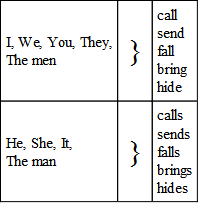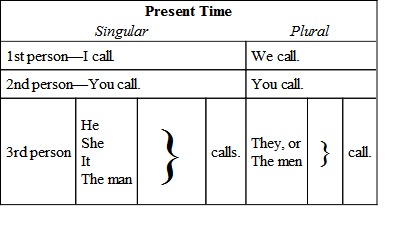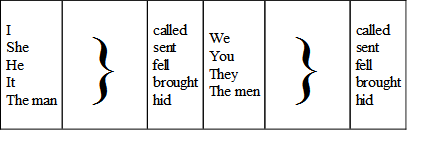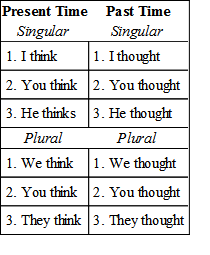 полная версия
полная версияPlain English
102. Verbs that express state or condition are called copulative verbs.
The word or words that complete the meaning of an incomplete verb expressing state or condition, are called the complement, or attribute complement.
There are only a few of these copulative verbs. All forms of the verb, be; like am, is, are, was and were, and the verb phrases like must be, can be, will be, shall be, have been, had been, etc.; and the verbs seem, appear, become, look, feel, taste, sound and smell, are the principal copulative verbs.
Exercise 3
Study carefully the following sentences. Note whether the complement of the copulative verb is an adjective or a noun. Draw one line under each adjective used as a complement and two lines under each noun used as a complement.
The day is beautiful.
I am weary and tired.
The men were soldiers.
The tasks seem endless.
All men must be free.
The workers have been slaves.
The burden becomes heavier every day.
The children feel happy and care-free.
Evolution is the development of life.
Grammar is the study of words and their use.
Knowledge is freedom.
The music sounds sweet on the midnight air.
He looks well today.
The dregs taste bitter.
The incense smells sweet.
Exercise 4
Complete the following sentences by adding an object or a complement.
1. Perseverance in your study will bring.......
2. The great need of the working class is.......
3. We shall never acknowledge.......
4. By the sweat of no other's brow shalt thou eat.......
5. The Revolutionary fathers founded.......
6. The workers demand.......
7. Labor's only road to freedom is.......
8. Life, liberty and the pursuit of happiness are.......
9. If you struggle, you will gain.......
10. An incomplete verb requires.......
11. The complement of a transitive verb is called.......
12. The complement of a copulative verb may be either......or.......
103. There are two classes of verbs, complete and incomplete.
A complete verb is one that requires no complement.
An incomplete verb is one that requires a complement to complete its meaning.
Incomplete verbs are of two kinds: 1. Those that express action; 2. Those that express state or condition.
Incomplete verbs that express action are called transitive verbs.
Incomplete verbs that express state or condition are called copulative verbs.
The complement or the word that denotes the receiver of the action expressed in a transitive verb is called the object.
The word or words that complete the meaning of a copulative verb are called the complement, or attribute complement.
The same verb may be complete or incomplete, according to the way in which it is used.
Exercise 5
In the following sentences draw a single line under the complete verbs and a double line under the incomplete verbs. Then determine whether the incomplete verbs are transitive or copulative verbs, and draw a line through the object or the complement.
1. Some plants are poisonous.
2. A rolling stone gathers no moss.
3. Perseverance brings success.
4. Delays are dangerous.
5. A man's actions show his character.
6. He looks well and feels stronger.
7. The snows come and the flowers fade.
8. Labor creates all wealth.
9. Labor must be free.
10. The boy writes well.
11. The man wrote a letter.
12. The skies are clear.
13. The hail destroyed the wheat.
14. No man is ever too old to learn.
15. Competition makes enemies.
16. Co-operation makes friends.
17. Competition breeds hatred.
18. Co-operation breeds good will.
19. Competition ensures war.
20. Co-operation ensures peace.
Exercise 6
In the following quotation all of the verbs are printed in italics. Determine whether they are complete or incomplete verbs. If incomplete, determine whether they are transitive or copulative verbs. Draw a line under the object of every transitive verb and two lines under the complement of every copulative verb. Remember that sometimes we have several words combined into a verb phrase and used as a single verb. Watch for the verb phrases in the following, as for example: must be, in the sentence, Labor must be free.
The history of man is simply the history of slavery. Slavery includes all other crimes. It degrades labor and corrupts leisure. With the idea that labor is the basis of progress goes the truth that labor must be free. The laborer must be a free man.
There is something wrong in a government where honesty wears a rag and rascality dons a robe; where the loving eat a crust while the infamous sit at banquets.
Talk about equal opportunity! Capitalism ties a balloon to the shoulders of the rich child; it ties a ball and chain to the feet of the poor child; and tells them that they have an equal opportunity!
Once the master hunted for the slaves, now the slave hunts for a master.
Exercise 7
Mark the verbs in the following poem. Often in poetry words are omitted which in strict grammatical construction should be expressed. As for example in the fourth line of this poem which are, is omitted before the word bought. In prose this would read, The pews which are bought by the profits, etc. So the word bought is a part of the verb phrase, are bought. In the last line of the third stanza there is another omission before the word planning. The meaning is, while they are planning slaughter. Planning is a part of the verb phrase are planning. And in the last line is is omitted before the word beloved. Is beloved is the verb phrase. Determine whether the verbs in this poem are complete, transitive or copulative, and mark the objects and the complements of the transitive and the copulative verbs.
WHO IS A CHRISTIAN?Ella Wheeler Wilcox"Who is a Christian in this Christian landOf many churches and of lofty spires?Not he who sits in soft, upholstered pewsBought by the profits of unholy greed,And looks devotion while he thinks of gain.Not he who sends petitions from the lipsThat lie to-morrow in the street and mart.Not he who fattens on another's toil,And flings his unearned riches to the poorOr aids the heathen with a lessened wage,And builds cathedrals with an increased rent.Christ, with Thy great, sweet, simple creed of love,How must Thou weary of earth's "Christian" clans,Who preach salvation through Thy saving bloodWhile planning slaughter of their fellow men.Who is a Christian? It is one whose lifeIs built on love, on kindness and on faith;Who holds his brother as his other self;Who toils for justice, equity and peace,And hides no aim or purpose in his heartThat will not chord with universal good.Though he be a pagan, heretic or JewThat man is Christian and beloved of Christ."SPELLING
LESSON 5
We often have two vowels used in the same syllable as a single sound, as ou in round, oi in oil, etc.
A diphthong is a union of two vowels to represent a single sound different from that of either alone.
Sometimes we have two vowels used together in a combination which is really not a diphthong for they do not unite in a different sound. Only one of the vowels is used and the other is silent as ai in rain, oa in soap, etc.
The most common diphthongs are:
ou as in sound.
ow as in owl.
oi as in oil.
oy as in boy.
In the spelling lesson for this week mark the words in which the combination of vowels forms a diphthong. In some of the words the combination of vowels does not form a diphthong for only one of the vowels is sounded. Draw a line through the silent letter.
Monday
Straight
Aisle
Search
Breadth
Defeat
Tuesday
Exploit
Ceiling
Height
People
Feudal
Wednesday
Brought
Shoulder
Group
Compound
Trouble
Thursday
Royal
Coarse
Course
Broad
Flower
Friday
Laughter
Haunted
Plaid
Invoice
Chair
Saturday
Guide
Build
Grieve
Sieve
Renown
PLAIN ENGLISH
LESSON 6
Dear Comrade:
We have this week another lesson in verbs. Do not be discouraged if you do not understand it all at once. Little by little, it will grow clearer and you will master this important word.
The verb may seem involved to you, but a little application will soon make it clear. It is the most important word in the language to master. It almost seems as though the verb were a living, thinking thing. It changes outward form to accommodate itself to its subject in the number form and person form change. If it is entertaining a subject in the singular it adopts one dress; if it is entertaining a plural subject, more than one, the verb wears a different dress.
So also if the subject is the first person, the person speaking, or the second person, the person spoken to, or the third person, the person spoken of, the verb accommodates itself to the subject. The verb is the most agreeable thing for it changes its form to agree with its subject! So watch your verb and see that it agrees.
Refer constantly to your list of irregular verbs given in this lesson for we so often make mistakes in the use of these verb forms.
Then, too, the verb kindly changes its form to accommodate itself to the time of the action—action in the present, in the past, in the future—action completed before the present time—before some time past—or before some future time—and action progressing and not yet completed in the present, in the past or in the future. Then it can also change to show whether its subject is acting or being acted upon. Isn't the verb a wonderfully accommodating member of the co-operative commonwealth of words?
And can you not see hidden under all this, a marvelous development in the intellectual needs of men from the day of the savage's signs and grunts to the day when we can express such shades of meaning? This tool of expression, language, has had a wonderful evolution side by side with the evolution of the other tools by which man expresses his creative genius; from the forked stick with which man scratched the soil to the great machine-driven plow of today; from the simple threshing flail to the monster threshing machine of modern times.
There is nothing so wonderful as man's ability to express himself. Add a little to your knowledge every day and the sum total will soon surprise you.
Yours for Education,THE PEOPLE'S COLLEGE.INFLECTION—CHANGES IN FORM
104. You remember that nouns have certain changes in form to indicate changes in use. Verbs also have several changes in form to correspond with changes in their use or meaning. Notice the following sentences:
I think.
I thought.
I work.
I worked.
What is the difference in the meaning of I think and I thought? of I work and I worked? When we say, I think, or I work, we mean that the action is now, to-day, in the present; but when we say, I thought, or I worked, we mean that now is not the time of the action, but that the action was performed sometime in the past. So we have a change in the verb form to denote time. The simple form of the verb, like think or work, is used to denote present time. When we wish to express past time we do it by changing the form of the verb. Now note the following:

Now let us write this in another way.

105. You notice in this table we use the expressions first person, second person, and third person. I and we indicate the person or persons speaking and are called the first person. You indicates the person or persons spoken to and is called the second person. He, she, it, they, and the person or persons or things spoken of, are called the third person.
We use the word you when speaking to one or more than one now-a-days. It used to be that when speaking to a single person, people said thou, and in speaking to two or more they said you. But we today have dropped the old form thou, and use you for both singular and plural.
106. Now note, in the above table, that there is only one form change in the verb, and this is in the third person singular. We say I call, You call, We call, They, or The men call, but we say He, or the man calls, in speaking of one person or thing. So we change the form of the verb with any subject which denotes the third person and the singular number. This form is made by adding s to the simple form of the verb, therefore we may call it the s-form because it always ends in s.
Remember that this s-form is used to express present time with a third person, singular subject. BE CAREFUL NOT TO USE THIS FORM WITH ANY PLURAL SUBJECT. There is no other change in the verb form in expressing the present time in any verb, except in the verb be.
107. This little verb be is one of the most troublesome verbs in our language, and since it is used in forming verb phrases, it will be well to commit the following table to memory. Watch closely your use of this bothersome little word. Note that it has a change in form for the first person singular, as well as for the third person singular. All other verbs have just the one change, the s-form for the third person singular. The verb be has a form also to use with the first person singular, the pronoun I.

108. The present time form is the form which expresses present time. It is expressed by the simple form of the verb with the exception of the third person singular, which is expressed by the s-form.
PAST TIME
109. To express past time we change the form of the verb. Notice the following:

Notice that these various forms of the verb which express past time are all made by changes from the simple form, which expresses present time. You will also notice that these five verbs used in the above table all form their past time form in different ways. For example, call adds ed; send changes the final letter from d to t; fall changes the vowel in the middle of the word from a to e; bring changes both the vowel and the final letter from bring to brought; hide drops the final letter e.
110. Verbs whose past time forms are made by adding d or ed to the simple form are called regular verbs.
Verbs whose past time forms are made in some other way than by adding d or ed are called irregular verbs.
111. There are about two hundred of these irregular verbs which form their past time in the following ways:
1. By change in the vowel letter, as fall, fell; write, wrote; see, saw; sing, sang; come, came.
2. By dropping the final vowel; as hide, hid; slide, slid; bite, bit.
3. By dropping a vowel from the middle of the word; as bleed, bled; feed, fed; lead, led.
4. By changing the final letter or letters; as send, sent; lose, lost; spend, spent.
5. By changing the vowel and final letters; as bring, brought; seek, sought; catch, caught.
6. By changing the vowel sound and adding t or d; as sleep, slept; feel, felt; flee, fled.
There are some irregular forms which we must learn and be exceedingly careful in their use. Study the list in this lesson.
Exercise 1
Write the present and past time forms of the following verbs as the verb think is written in the table given below.
think
ride
have
give
write
ask
make
try
speak
run
see
do

112. Be very careful not to use the s-form except for the third person singular. Be especially careful in the use of different forms of the verb be. It is in the use of this verb that we so frequently make mistakes. Watch your own language and the conversation of your friends and note these mistakes and correct them in your own mind. These common blunders in the use of English mark us as careless or uneducated by everyone who hears us speak. We have fallen into bad habits oftentimes and make these mistakes when we know better, and only constant watchfulness for a time can overcome the habit. After a time we learn to speak correctly without effort, and then these mistakes made by others offend the ear like a false note in music.
Exercise 2
Cross out the wrong form in the following:
They was—were not here.
The clouds has—have gathered.
People is—are indifferent.
The train was—were on time.
The men was—were armed.
Our school building is—are inadequate.
The workers earn—earns their wages.
The voters elect—elects the President.
They do—does as they please.
We was—were there on time.
DOING DOUBLE WORK
113. We have found now three forms of the verb, the simple form, the s-form, and the past time form, and, in addition, the I-form, or the first person form of the verb be. There are no other real verb forms, but there are two other changes made in the form of the verb when it ceases to be used as the predicate, the asserting word of the sentence, and becomes, in part, another part of speech.
Notice in the following sentences:
Making shoes is his work.
He enjoys making shoes.
In each of these sentences the word making, from the verb make, is used as a noun. In the first, Making shoes is his work, making is used as the subject of the sentence. In the second, He enjoys making shoes, making is used as the object of the verb enjoys. But making is not like the ordinary noun, for it has an object making—what?—making shoes. Shoes is the object of the action expressed in making. A noun never takes an object; so while the word making is used as a noun, it is also partly a verb. It is a form of the verb used as a noun, but keeping in part its verb nature, partaking of the nature of two parts of speech at the same time.
Hence these forms of the verb are called participles. Participle means partaker.
The participle may also be used as an adjective. Notice the following:
The crying child came toward us.
The rescuing party arrived.
In these sentences crying and rescuing are formed from the verbs cry and rescue, and are used as adjectives to describe the noun child and the noun party. So a participle is a mixed part of speech. It is partially a verb, but is not a true verb. A true verb is always used as the predicate, the asserting word in the sentence and always has a subject. The participle never has a subject; it may have an object, but not a subject.
114. There are two forms of the participle. The active form or the present form as it is sometimes called, ends in ing, as, waiting, walking, saying. It expresses action, existence, or possession as going on at the time mentioned in the sentence.
115. The other form of the participle is the passive form or the past form of the participle. This ends in ed in the regular verbs, and has various forms in the irregular verbs. It is formed in regular verbs by adding d or ed to the simple form, hence has the same form as the past time form, as for example, present time form, call—past time form, called—past participle, called. You will find the past participle forms of irregular verbs in the list of irregular verbs given in this lesson, as for example—present time form, go—past time form, went—past participle, gone.
116. You will find as we study the verb phrases in later lessons that these participles are used in forming verb phrases. As for example:
He is coming.
They are trying.
He has gone.
A participle is a word derived from a verb, partaking of the nature of a verb and also of an adjective or a noun.
LET US SUM UP
117. Verbs have five form changes.

Exercise 3
Write in columns like the above the five forms of the following verbs:
do
try
give
hope
live
rob
have
think
sing
get
wave
lose
come
make
Exercise 4
Study carefully the following quotation. You will find in it all five of the form changes of the verb—the present time form, the s-form, the past time form, the present participle and the past participle. In the verb phrases had been filled, has survived, has gone, has proved and be dismayed, you will find the past participle used in forming the verb phrase. We will study these verb phrases in later lessons.
In the verb phrases, was stumbling, was groping, is conquering, are carrying, the present participle is used in forming the verb phrases. Could reconcile is also a verb phrase. We will study these verb phrases also in later lessons.

